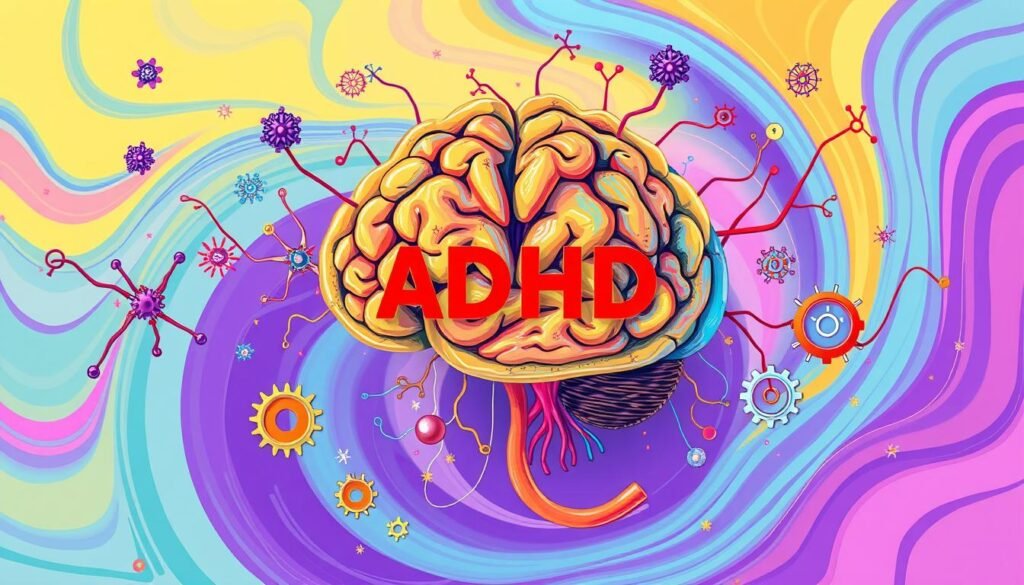Surprisingly, 62% of those with ADHD might also have chronic fatigue. This shows a strong but often unnoticed link between the two. ADHD, or Attention Deficit Hyperactivity Disorder, is not just about being hyper or impulsive. Many with it also feel very tired and stressed out. This link helps us understand how ADHD can greatly affect someone’s mental health and daily life. It leads to chronic fatigue that hurts their emotions and how they think.
People with ADHD often find daily life hard. They feel mentally worn out and have trouble relaxing. This can lead to intense fatigue. This article will look into how ADHD and chronic fatigue interact. We’ll see how these connected conditions make challenges that are more than just feeling tired.
Key Takeaways
- 62% of individuals with ADHD also experience chronic fatigue symptoms.
- ADHD is linked to increased levels of tiredness and stress compared to those without the disorder.
- Fatigue in ADHD may result from difficulty in managing life responsibilities.
- Dysregulated brain function in ADHD can contribute to increased feelings of mental fatigue.
- Common behaviors like overworking can lead to burnout in adults with ADHD.
The Complexity of ADHD: More Than Just Hyperactivity
ADHD is more than just kids being hyper. It involves a wide array of challenges that make daily life tough. People with ADHD often struggle with cognitive impairments.
These struggles include paying attention, acting impulsively, managing emotions, and planning. These issues can make simple tasks very hard. This leads to frustration and feelings of not being good enough.
Studies show kids with ADHD or autism could get chronic fatigue by age 18. This type of fatigue makes energy levels go up and down. It makes keeping a steady work pace hard.
This fatigue can also hurt their mental health. It can make people feel alone and exposed.
- Neurodivergent children often feel lonelier.
- They are at a greater risk of being bullied.
- Nearly 75% of adults with ADHD have different sleep patterns.
- Not being diagnosed can leave conditions untreated, making life harder.
Looking into ADHD’s complexity shows it’s much more than just hyperactivity. Each person with ADHD faces unique challenges. It’s important to recognize that their struggles are significant and need attention.
Understanding Chronic Fatigue Syndrome (CFS)
Chronic Fatigue Syndrome (CFS) is a condition that leads to extreme tiredness. This tiredness doesn’t go away with rest. It is crucial to understand the deep effects it has on both body and mind. People with CFS find everyday activities difficult.
This illness often brings mental exhaustion that feels too heavy to overcome. Studies show that adults with ADHD might be more prone to get tired often. Stress and sadness are common with ADHD and can make the tiredness worse. Living with CFS means dealing with challenges that affect all parts of life.
Identifying the signs of CFS is key for both doctors and those living with it. When CFS stops people from doing what they love, life feels less fulfilling. Being aware helps in finding the right ways to handle the illness. This can lead to a better daily life and happiness.
Inside the Surprising Link Between ADHD and Chronic Fatigue
Studies are finding a link between ADHD and chronic fatigue in adults. Many people with ADHD also battle ADHD fatigue. This isn’t just being tired. It’s also feeling emotionally worn out. Managing ADHD can be mentally exhausting due to difficulties with memory and decision-making.
Adults with ADHD often have trouble sleeping. This makes their fatigue worse. Having trouble getting to sleep and staying asleep adds to their tiredness. Also, ADHD medications, especially stimulants, can make them feel more tired as the day goes on.
About half of those with ADHD also face other mental health issues like depression and anxiety. These can make the emotional exhaustion even worse. Also, around 25% of people with chronic pain have ADHD. This suggests a possible link because those with ADHD may feel more pain. This could be due to inflammation in the brain and structural differences, offering clues to the fatigue they experience.
This understanding could lead to better treatments. Current ADHD treatments like therapy and medication might help ease the related fatigue. For more insight, check out this article on the link between adult ADHD and.
| Factor | Impact on ADHD Fatigue |
|---|---|
| Sleep Difficulties | Increases emotional exhaustion and physical tiredness |
| Comorbidities | Includes depression and anxiety, heightening fatigue levels |
| Cognitive Demands | Exhausts mental energy; struggles with multitasking amplify fatigue |
| Medication Effects | Stimulants may cause tiredness once their effects diminish |
| Chronic Pain | Individuals with ADHD often report higher pain levels, contributing to overall fatigue |
The Science Behind ADHD and Fatigue
The link between ADHD and fatigue is complex. People with ADHD deal with special cognitive demands. This can lead to both mental and physical tiredness. The challenges include managing distractions, controlling impulses, and handling emotions well.
Cognitive Demands on Individuals with ADHD
Those with ADHD often feel worn out due to the brain’s demands. Trying to focus and avoid distractions causes mental fatigue. This tiredness is more than just feeling sleepy. It includes brain fog and a slow thinking speed. The effort to deal with these demands is tiresome.
Neurotransmitter Regulation Issues
Dopamine and serotonin imbalances play a big role in ADHD. These imbalances can make fatigue worse. They also affect motivation and emotional stability. Studies show these problems can hurt executive functions and reward processing. This leads to more mental work and tiredness. Treating these imbalances can help reduce ADHD-related fatigue.

| Cognitive Demand Factors | Fatigue Symptoms |
|---|---|
| Difficulty in focusing leading to mental exhaustion | Brain fog and sluggish cognitive tempo |
| Efforts to manage impulses contributing to stress | Feelings of being overwhelmed and chronic tiredness |
| Struggles with emotional regulation | Increased anxiety and depression symptoms |
| Challenges in task completion driving burnout | Physical fatigue and restlessness |
Knowing the science behind ADHD helps us understand the fatigue it causes. Recognizing the cognitive demands and neurotransmitter issues is key. It leads to better management and treatment for those affected.
Symptoms of Fatigue in ADHD Patients
People with ADHD often struggle with unique challenges from fatigue. ADHD fatigue shows up in different ways. Knowing these signs helps in managing it better. It’s crucial to understand both mental and physical exhaustion.
Mental Exhaustion and Cognitive Impairments
Mental exhaustion for ADHD patients can mean having trouble staying focused. They might also feel very unmotivated. This often leads to a big drop in how much they can do. Many people with Chronic Fatigue Syndrome (CFS) might also have ADHD. This is especially true for those with the inattentive type of ADHD. It’s key to see how ADHD fatigue can really impact how we think.
Physical Fatigue: More Than Just Tiredness
Physical fatigue in ADHD folks is more than just feeling tired. It can include chronic pain and greatly affect life quality. When overloaded, our bodies might kick off the sympathetic nervous system, leading to ongoing fatigue. Also, many adults with ADHD might have trouble sleeping well, like with sleep apnea. Taking good care of yourself, sticking to a sleep schedule, and getting medical advice are important. Knowing the link between these symptoms and ADHD is crucial for healing. For more details on understanding fatigue diagnoses, visit this resource on ICD-10 fatigue codes.
The Role of Sleep in ADHD-Related Fatigue
Sleep is crucial for managing ADHD-related fatigue. Studies show sleep and ADHD affect each other. For example, sleep issues can make ADHD symptoms worse. And, ADHD can lead to problems with sleep.
Kids who don’t sleep well often feel more ADHD symptoms as they get older. This includes having trouble sticking to a regular sleep schedule, not sleeping enough, and waking up a lot at night.
Many people with ADHD also have sleep disorders like insomnia or sleep apnea. These issues can cause ongoing tiredness. This tiredness can make kids more hyper and adults feel very worn out. Handling sleep well is key to lessening ADHD-related tiredness.

To get better sleep, try having a usual bedtime and getting plenty of exercise. Doing things like calming down before bed, not eating heavy meals late, and taking meds at the right time helps too. These steps can make a big difference.
Not sleeping enough can also affect eating habits and lead to weight gain. People with ADHD might snack more and choose less healthy foods when they’re tired. This can cause weight issues. Getting good sleep can help manage ADHD and improve health overall. For more on sleep and ADHD, visit this resource.
Coping Mechanisms for ADHD and Chronic Fatigue
Finding ways to cope with ADHD is crucial. It helps manage symptoms and ease chronic fatigue. By adopting effective strategies, daily life gets better and overall well-being improves. Using tools to organize and taking mindful breaks can change how daily tasks are managed.
Utilizing Organizational Tools
Organizational tools help simplify tasks and lessen mental load. For instance, using different colors on calendars makes planning easier. This makes it simpler for the brain to find information. Lists and apps help sort tasks, reducing stress from busy schedules.
Using the Pomodoro Technique, which mixes work with short breaks, boosts focus and efficiency. Fidget spinners can also help keep you on task. They encourage good habits in people with ADHD.
The Importance of Breaks and Downtime
It’s important to take breaks for your mental health. These breaks recharge your brain and stop burnout, which is common in ADHD. Building rest into your schedule is key, especially if it includes taking care of yourself. This means getting enough sleep and eating well.
Cutting down on sweets and caffeine helps balance your mood and energy. When these habits are part of life, you may feel more balanced and healthier overall.
Burnout: When ADHD Symptoms Intensify
ADHD burnout happens when the stress of dealing with intensified symptoms gets too much. About 75% of adults with ADHD feel tired, sluggish, or have less energy. These feelings greatly impact their day-to-day life.
People with ADHD often struggle with keeping on time, staying organized, and controlling their actions. These challenges make them more likely to feel worn out. Facing mental health challenges, like depression or anxiety, makes things even harder. It leads to deeper fatigue.
Sleep problems, such as insomnia or sleep apnea, are common with ADHD. These issues make fatigue worse, causing a hard-to-stop cycle. ADHD burnout tends to show up as less productivity and more stress. It’s important to spot these early signs.
Extra sensitivity and Rejection Sensitivity Dysphoria (RSD) increase emotional stress for those with ADHD. This strain can lower self-esteem and make burnout effects stronger. Many people also have weaker executive functions, which adds to ADHD challenges.
To fight ADHD burnout, focusing on good management is key. Getting help from healthcare providers can make a big difference. Making realistic goals and finding personal strategies help lower the risk of burnout.
Keeping up healthy habits is critical. This includes regular exercise, eating well, staying hydrated, and getting enough sleep. Having clear limits in relationships also helps avoid taking on too much, which can raise stress.
Relaxation techniques, like mindfulness and hobbies, are effective for stress management. Having a support network of friends, family, and therapists is very helpful. They offer emotional and practical support for dealing with ADHD burnout.
The Impact of Co-existing Disorders
Co-existing disorders make life harder for people with ADHD and chronic fatigue. ADHD is more common in those with chronic fatigue syndrome (CFS). This shows a big overlap between the two conditions. They share symptoms like attention and memory problems, making diagnosis and treatment tricky.
It’s important to understand how these disorders work together. Anxiety and depression often occur alongside ADHD and chronic fatigue. This can start a cycle of worsening mental health that makes symptoms worse. People can feel stuck in a loop where each disorder makes the others more severe.
Views on fatigue are changing. More research shows that central nervous system fatigue plays a big role in these conditions. Chronic fatigue syndrome causes severe, lasting tiredness. Studies suggest too much tryptophan moving into the brain may be a key issue. Adults with ADHD often have lower levels of tryptophan and related chemicals, which could add to their fatigue.
For adults with ADHD, symptom severity can change with levels of tryptophan and kynurenine. Emotional issues can cause more emotional tiredness, making co-existing disorders harder to manage. Problems like insomnia and being tired during the day add to the challenge for those with both disorders.
| Co-existing Disorder | Impact on ADHD and Chronic Fatigue |
|---|---|
| Anxiety | Increases tension; exacerbates focus difficulties and fatigue |
| Depression | Contributes to emotional exhaustion and disrupts motivation |
| Sleep Disorders | Worsens fatigue; results in poor cognitive performance |
Understanding the link between these issues highlights the need for special treatment plans. These plans should address ADHD and chronic fatigue and the mental health problems that come with them. A focused approach can improve lives and help those with co-existing disorders feel better.
Managing ADHD Symptoms to Alleviate Fatigue
To lessen fatigue, managing ADHD is key. Studies show that 75% of adults with ADHD feel very sleepy during the day. This tiredness comes from sleep problems, brain work, and meds’ side effects. Making a daily plan helps control your energy.
Working out helps too. It makes you feel better and less tired. Plus, trying things like deep breathing can make ADHD easier to handle. This can make you feel less tired.
It’s vital to understand how ADHD makes you think harder. This can make you very tired. Learning skills to deal with ADHD can make you less exhausted. Behavioral therapy gives tips for better focus which reduces tiredness.

| Strategy | Description | Benefits |
|---|---|---|
| Routine Establishment | Creating a structured daily schedule | Helps maintain energy levels and reduce mental exhaustion |
| Regular Exercise | Engaging in physical activity consistently | Boosts mood and decreases fatigue |
| Behavior Modification Techniques | Implementing practices like mindfulness | Reduces cognitive load; enhances focus |
| Sleep Hygiene Practices | Improving sleep quality with habits like maintaining a sleep schedule | Can alleviate insomnia and improve overall energy |
Being proactive about ADHD can really help with fatigue. It lets people do better in their daily lives.
Seeking Professional Help
Understanding and managing ADHD can be challenging. It’s important to seek professional help for ADHD and related fatigue. Doctors can assess your needs and create a treatment plan just for you.
Identifying the Right Treatment Approach
Healthcare professionals evaluate your situation to find the best treatment. They might suggest behavioral therapy and changes in lifestyle. Follow-up visits are key to adjusting your treatment, ensuring it works well for you. Structuring your day can also help save energy.
Medication’s Role: Stimulants and Their Effects
Medications are a big part of ADHD treatment. Stimulants like methylphenidate and amphetamines help focus and control impulses. It’s important to understand how these drugs work to make good decisions about your care. They improve brain function but must be used carefully due to possible side effects. Discussing medication options with a doctor ensures your treatment is just right for you.
Conclusion
The link between ADHD and chronic fatigue is both deep and important. It shows a complex connection that impacts many people. Knowing more about this link is key for better health care, especially for those dealing with both issues.
Research keeps showing the importance of coping methods and support to deal with ADHD and chronic fatigue together.
Many find treatments like psychostimulants helpful for both ADHD and chronic fatigue symptoms. Yet, some people don’t get the expected relief, which calls for more research into treatment effects and health care access.
It’s crucial for those affected to have support and resources. Recognizing and meeting their own needs is a big step towards a balanced life. For tips on dealing with these issues, check out current research on ADHD and chronic fatigue.